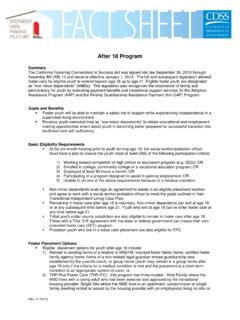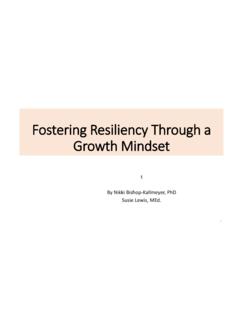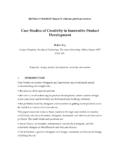Transcription of Frequently Asked Questions-AB 12 for Probation …
1 Frequently Asked Questions: AB 12 for Probation youth _____ Derived from the AB 12 question of the Week Blog by the John Burton Foundation and the Alliance for Children s RightsFollow the AB 12 question of the Week Blog at Learn more about AB 12, The Fostering Connections to Success Act at 1) DELINQUENCY VS. DEPENDENCY AND ELIGIBILITY FOR EXTENDED FOSTER CARE Does a delinquency youth have the same re entry rights and process as a dependency youth ? youth in the delinquency system are eligible for extended foster care if they are under an order for foster care placement on their 18th birthday. Further, the California Fostering Connections to Success Act provides mechanisms for certain wards to enter transition jurisdiction prior to their 18th birthday, which would provide those youth with eligibility for extended foster care benefits in the same manner as youth under dependency jurisdiction upon turning 18.
2 youth who are either (1) under the court s transition jurisdiction or (2) under the court s delinquency jurisdiction AND under an order for foster care placement on their 18th birthday have all the rights as youth in the dependency system to participate in extended foster care, including the right to re enter care. (Welfare & Institutions Code 388(e)). Note: As long as a youth is still adjudicated as a 602 (delinquent) after turning 18, this youth does not have the same rights to exit and re enter because they are still subject to the terms of their Probation . However, if there was an order for foster care placement on the youth s 18th birthday, then once the youth finishes the terms of Probation , s/he will transfer to transition jurisdiction and then have all the same rights to exit and re enter as any other non minor dependent.
3 2) RE ENTRY TO FOSTER CARE AFTER INVOLVEMENT WITH ADULT CRIMINAL JUSTICE SYSTEM If a youth exits foster care and becomes involved with the adult criminal justice system, does that disqualify him from re entering extended foster care? No; the existence of a criminal conviction does not bar the court from resuming either dependency or transition jurisdiction. If placement in a licensed or approved foster or relative home with dependent minors in the residence is planned for a youth who is re entering, the county may elect to do a background check of the youth . The background check is solely for purpose of determining appropriate placement. Although the Health and Safety Code requires that adults residing in a licensed foster family home are subject to criminal background clearances, these sections do not apply to non minor dependents residing in licensed foster family homes, because they are considered clients.
4 This also applies to non minor dependents in relative and non related extended family member homes. (All County Letter No. 12 12). 3) EXTENDED FOSTER CARE ELIGIBILITY FOR A NON MINOR DEPENDENT ON ADULT Probation STATUS If a non minor dependent (NMD) is arrested as an adult and put on adult Probation status, will the adult Probation status affect his/her eligibility for extended foster care? The adult Probation status does not change the NMD s eligibility for extended foster care; although, there may be circumstances when the adult Probation status may be taken into account when determining the most appropriate placement for the NMD. While a NMD who becomes subject to adult Probation has a right to a placement and also has the same range of placement options available, including THP Plus Foster Care or a Supervised Independent Living Placement, the placing county must find a placement that ensures the safety and well being of all other minor dependents and NMDs who are residing in the same setting.
5 Each county has the obligation of revising their county protocols (known as the WIC protocols) to determine who will supervise and oversee a NMD s case if and when a NMD becomes subject to adult Probation . (All County Letter No. 11 85, page 8). 4) INCARCERATED NON MINOR DEPENDENTS ELIGIBILITY FOR EXTENDED FOSTER CARE Are non minor dependents (NMDs) eligible for extended foster care while incarcerated? No, NMDs are not eligible for extended foster care while incarcerated because they are unable to reside in a licensed or approved placement, which is one requirement of extended foster care. Once the NMD is released, s/he is eligible to re enter foster care provided s/he meets all relevant eligibility criteria. (All County Letter No. 11 69, page 4).
6 5) EXTENDED FOSTER CARE ELIGIBILITY FOR AN 18 YEAR OLD IN JUVENILE HALL If a youth turns 18 while in juvenile hall, will s/he be eligible for extended foster care? In order to be eligible to participate in extended foster care a youth must have an order for foster care placement on his/her 18th birthday. This requirement applies to all youth including wards in juvenile court ( 602 youth ). Therefore, if a youth is in juvenile hall but that youth has an order for foster care placement on his/her 18th birthday (which occurs when the youth is waiting for a placement to become available), then s/he is eligible to participate in extended foster care. If there is no order for foster care placement and the youth is detained in juvenile hall on his/her 18thbirthday, then that youth will not be eligible for extended foster care.
7 (All County Letter No. 11 85). 6) THE EFFECT OF PLACING A WARD ON RELEASE STATUS ON AB 12 SERVICES I am a Probation officer and am working with a 17 year old ward who is scheduled to go to court next month. He currently has a placement order and is living with his aunt. He is making good progress and I expect that the judge will remove the placement order and put him on release status. If this occurs, how will it affect his eligibility for extended services to age 21, under Assembly Bill 12? If the judge puts the youth on release status and removes the placement order, the youth will not be eligible for extended support services when he turns 18 years old. In order to be eligible for extended services to age 21, under Assembly Bill 12, the youth must have an order for foster care placement on his/her 18th birthday.
8 In this particular instance, if the judge maintained the placement order with the aunt, the youth could have Probation dismissed at age or later, and become a transition dependent under WIC 450. As a transition dependent, the youth would be eligible for AB 12 related benefits, including housing, continued funding, and extended Medi Cal. (Welfare & Institutions Code 11403(b)). 7) RIGHTS OF youth WITH A 602 STATUS I am the Probation officer of an 18 year old non minor dependent who is placed in a group home. He is under delinquency jurisdiction (602 status) and is expected to complete his rehabilitative goals in July at which time the judge will likely place him in transition jurisdiction. His group home is allowing him to own and use a cell phone and to be allowed to go and enter at will, citing the Community Care Licensing Interim Standards, even though these actions violate the youth s Probation terms that disallow either of those activities.
9 My question is as follows: Does this youth have the same rights as a youth who is in extended foster care under transition jurisdiction (450 status) or dependency (300 status) or do Probation rules trump the non minor dependent s rights under Community Care Licensing? No; this youth under delinquency jurisdiction does not have the same rights as a youth under transition or dependency jurisdiction. This youth will have the full rights as a non minor dependent (NMD) once the court has found that he has successfully met his rehabilitative goals. Assembly Bill 1712 clarified that the 602 NMD is not required to compete the mutual agreement, and their decision making may be limited by the terms of their Probation . Specifically, WIC 303(d)(2) states that a NMD who remains under delinquency jurisdiction in order to complete his or her rehabilitative goals and is under a foster care placement order is not required to complete the mutual agreement as described in subdivision 9u) of Section 11400.
10 His or her adult decision making authority may be limited by and subject to the care, supervision, custody, conduct, and maintenance orders as described in section 727. 8) AB 12 ELIGIBILITY FOR youth WITH 602 STATUS I have a youth who remains a 602, but was told that he could be eligible for AB 12 and get funding because he was 18 years old. Is that correct? So in other words, these kids would be AB 12 eligible automatically upon turning 18 years old. I m not sure how that is possible. How can they be a 602 and 450 at the same time? Can you provide me with some clarification? If a Probation youth with an order for out of home placement turns 18 years old and remains a 602 they are entitled to continue to receive benefits and also remain subject to the terms of their Probation .




